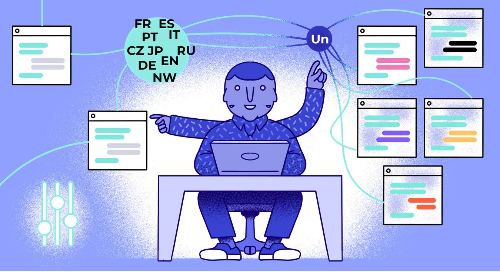AI and machine translation have come a long way since its early days. Even so, human translators are still a very critical part of the process. Many companies rely on hybrid human-machine translation to complete critical tasks in areas such as multilingual customer service, where high stakes interactions can make or break customer satisfaction and long-term loyalty. Human translators are essential to ensuring that these conversations are accurate and reflect the local, cultural nuances of each language.
With the evolution of machine translation, the role of the translator itself has changed significantly. Let’s take a look at how.
1. Unlocking more opportunity
Let me start by saying that there are still many types of translators out there. Some professional translation jobs, such as those at literary publishing houses, haven’t changed much with the advent of machine translation. There’s too much nuance, for example, in a poetry book or a young adult fiction novel for a machine to effectively understand it.
However, there are many new jobs for freelance translators that can be picked up from anywhere in the world, at any time. For example, many Unbabel editors in our community pick up customer service translation jobs on the side or in their spare time to earn extra income. Our community members range from recent graduates to caregivers that want to have the flexibility to work outside the traditional “work hours.” Some editors who have faced financial hardships due to the pandemic have been able to make extra income. These new opportunities fill the freelancer availability gap, and are made possible by AI-powered platforms like Unbabel.
What’s more, freelancers now have access to qualified roles such as annotation and term base creation. These talented translators can now learn and evolve into roles that once were restricted to academic or research groups. And, as we’ll cover next, human feedback from a new role of post-editor helps improve AI’s algorithms.
2. Translators play a key role in machine translation quality
Just like humans, machines are all about learning and continuous improvement. However, machine translation algorithms could not improve without human feedback. With Unbabel editors, translation corrections happen in very practical ways, but add up to major contributions for the entire machine learning community. In general, a new role of post-editor has evolved to meet the demands of machine translation.
Say, for example, an editor is working on corrections for an agent’s gaming company. The editor may correct a phrase in the translation that isn’t accurate in Brazilian Portuguese. These fixes will be sent directly to the gaming company’s customer, so the responses are as personal and accurate as possible. In the meantime, the machine translation team receives these fixes, which are applied to the algorithm so it can “learn” from its mistakes.
Unbabel editors are also asked to participate in machine translation research projects. Their corrections on words and phrases generated by the algorithm are used to improve machine learning research, and the results are shared with the community – in many cases through open source projects. Editors are interested and invested in what Unbabel is doing, because they know exactly how their fixes are helping both customers and the research community at large.
3. Global translators have found new communities
This year, office workers globally have learned what it’s like to work remotely. It can feel isolating, even for those who are used to working from home. That’s why communities and collaboration are so important. AI has opened up new online communities for translators that can create unexpected connections.
For example, the Unbabel community helps translators learn from one another, laugh at machines’ mistakes, and share their experiences. Translators in the community also get feedback from customers, so they can celebrate their successes. Best of all, they can both help each other do their jobs and build new friendships, just as colleagues in an office might do.
The human and AI relationship
In the coming years, the relationship between translators and machines is sure to evolve even further. Unbabel is proud to be at the forefront of this movement, opening up new opportunities for freelance translators and sharing our work with the machine translation research community.
To learn more about how our unique blend of human and machine translation provides always-on, multilingual customer support, check out our case studies.
The post 3 Ways the Translator’s Role Has Evolved with AI appeared first on Unbabel.












